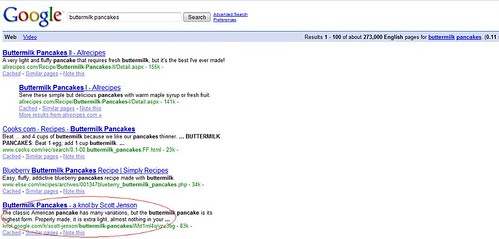For several months Nick Carr has pointed out that Wikipedia ranks highly in the search results for a number of common topics in Google's search engine. In his post entitled Googlepedia Nick Carr speculated on why Google would see this trend as a threat in a paragraph which is excerpted below
I'm guessing that serving as the front door for a vast ad-less info-moshpit outfitted with open source search tools is not exactly the future that Google has in mind for itself. Enter Knol.
Clearly Nick Carr wasn't the only one that realized that Google was slowly turning into a Wikipedia redirector. Google wants to be the #1 source for information or at least be serving ads on the #1 sites on the Internet in specific area. Wikipedia was slowly eroding the company's effectivenes at achieving both goals. So it is unsurprising that Google has launched Knol and is trying to entice authors away from Wikipedia by offering them a chance to get paid.
What is surprising is that Google is tipping it's search results to favor Knol. Or at least that is the conclusion of several search engine optimization (SEO) experts and also jibes with my experiences.
Danny Sullivan wrote in his post The Day After: Looking At How Well Knol Pages Rank On Google that
We've been assured that just because content sits on Google's Knol site, it won't gain any ranking authority from being part of the Knol domain. OK, so a day after Knol has launched, how's that holding up? I found 1/3 of the pages listed on the Knol home page that I tested ranked in the top results.
…
I was surprised to see a post covering how Knol's How to Backpack was already hitting the number three spot on Google. Really? I mean, how many links could this page have gotten already? As it turns out, quite a few. And more important, it's featured on the Knol home page, which itself is probably one of the most important links. While Knol uses nofollow on individual knols to prevent link credit from flowing out, it's not used on the home page -- so home page credit can flow to individual knols featured on it.
…
here's a test knol I made yesterday -- Firefox Plugins For SEO & SEM -- which ranks 28 for firefox plugins for seo. I never linked to it from my article about knol. I don't think it made the Knol home page. I can see only three links pointing at it, and only one of those links uses anchor text relevant to what the page is ranking for. And it's in the top 30 results?
Look, I know that being ranked 28 is pretty much near invisible in terms of traffic you'll get from search engines. But then again, to go from nowhere to the 28th top page in Google out of 755,000 matches? I'm sorry -- don't tell me that being in Knol doesn't give your page some authority.
Aaron Wall noticed something even more insidious in his post entitled Google Knol - Google's Latest Attack on Copyright where he notices that if Google notices duplicate content then it favors the content on Knol over a site that has existed for years and has decent PageRank. His post is excerpted below
Another Knol Test
Maybe we are being a bit biased and/or are rushing to judgement? Maybe a more scientific effort would compare how Knol content ranks to other content when it is essentially duplicate content? I did not want to mention that I was testing that when I created my SEO Basics Knol, but the content was essentially a duplicate of my Work.com Guide to Learning SEO (that was also syndicated to Business.com). Even Google shows this directly on the Knol page
Google Knows its Duplicate Content

Is Google the Most Authoritative Publisher?
Given that Google knows that Business.com is a many year old high authority directory and that the Business.com page with my content on it is a PageRank 5, which does Google prefer to rank? Searching for a string of text on the page I found that the Knol page ranks in the search results.
If I override some of Google's duplicate content filters (by adding &filter=0 to the search string) then I see that 2 copies of the Knol page outrank the Business.com page that was filtered out earlier.
Interesting.
Following Danny's example, I also tried running some searches for terms that appear on the Knol homepage and seeing how they did in Google's search. Here's the screenshot of the results of searching for "buttermilk pancakes"

Not bad for a page that has existed on the Web for less than two weeks.
Google is clearly favoring Knol content over content from older, more highly linked sites on the Web. I won't bother with the question of whether Google is doing this on purpose or whether this is some innocent mistake. The important question is "What are they going to do about it now that we've found out?"
Now Playing: One Republic -
Stop and Stare